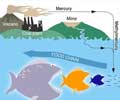Certain gene variants present in 30% of children increase susceptibility to methylmercury poisoning, finds a study.

‘Even in low-exposure settings, 30% of children carry this gene variant and are more vulnerable to prenatal methylmercury toxicity.’





Indeed, in a previous study with 1127 children from the ALSPAC Cohort in Bristol, UK, a group led by ISGlobal researcher Jordi Júlvez, identified four variants (also called polymorphisms) associated with a greater effect of methylmercury on cognitive development. In this study, Júlvez and colleagues included data from an additional 1045 children of the cohort, and explored more than 240 polymorphisms in candidate genes belonging to four major biological pathways relevant to neurodevelopment and neurotoxicity. They measured mercury concentrations in umbilical cord samples and evaluated intelligence quotient (IQ) at age eight, for all 2172 children. The analyses also adjusted for seafood diet (the main source of methylmercury but also a source of beneficial fatty acids) and maternal socioeconomic position.
The results show that the average concentration of methylmercury in cord blood was low (2.7ug/ml), likely reflecting the low frequency of fish intake by the general English population. Overall, no negative association was observed between methylmercury concentrations and IQ scores at eight years of age. However, the analyses revealed that children with polymorphisms in certain genes achieved lower IQ scores. In other words, children with these gene variants showed evidence of methylmercury toxicity that was not detectable in the cohort sample as a whole. "These findings emphasize the need to consider the impact of genetic predisposition when evaluating methylmercury toxicity," says Julvez.
Three of these polymorphisms were newly identified while two were confirmed from the previous study by the same team. One of the validated polymorphisms concerns the receptor for progesterone, a sexual hormone that seems to have a neuroprotective effect. The gene variant identified may function poorly, thereby decreasing the protective effect of progesterone. "Importantly, around 30% of children in the general population carry this gene variant and are therefore more vulnerable to prenatal methylmercury exposure, even in low-exposure settings," he adds. The results also reveal the need to further study the effects of the progesterone receptor variant on this and other environmental pollutants.
Advertisement













